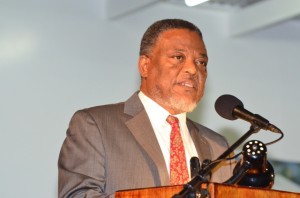– Hinds says concerns arise from wrong assumptions
By Michael Younge –
Acting President Samuel Hinds has sharply dismissed assertions that China Central TV (CCTV) has been granted a broadcast licence to operate in Guyana ahead of several local organisations, communities, and interested stakeholders.
Hinds, who appeared on Television Guyana’s Under the Microscope Programme on Monday, said that the concerns arose from incorrect assumptions, as he debunked claims that the government of Guyana had violated its own broadcast laws to the detriment and exclusion of its own people.




